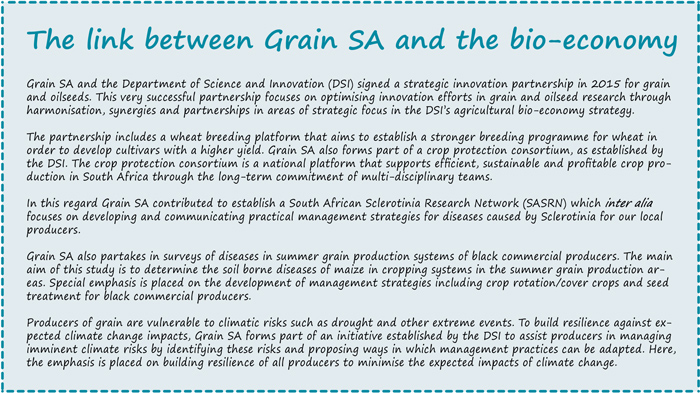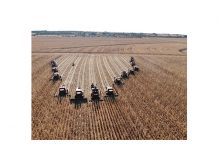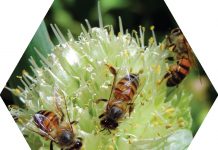Dr Maneshree Jugmohan-Naidu, whose expertise ranges from genetic diversity of plant pathogens to diagnostics in the health biotechnology sector, is the Director of Agricultural Biotechnology at the Department of Science and Innovation (DSI), previously the Department of Science and Technology (DST). Grain SA has been in a strategic partnership with the department for the past five years.
Her position makes her the custodian of the agricultural pillar of the South African national bio-economy strategy which was launched in January 2014. This strategy catalyses the creation of dynamic and networked strategic investments in research and development to foster innovative biotechnology. She inter alia co-ordinates key strategies and programmes in agricultural biotechnology and bio-economy, including international/bilateral co-operation, and the development of an enabling and conducive environment for responsible biotechnology in South Africa. This includes the Agricultural Bio-economy Innovation Partnership Programme (ABIPP) with the Technology Innovation Agency (TIA) as the implementing agent.

‘The vision of the agricultural sector of the bio-economy strategy is a vibrant and economically sustainable agricultural sector through bio-innovative technologies, products and services contributing to increased productivity, food security and rural economic development. In order to achieve this, the agricultural sector of the bio-economy strategy identifies the need to eradicate poverty and inequality, and to promote job creation,’ says Dr Jugmohan-Naidu.
‘Moreover, it supports the Department of Agriculture’s Agricultural Policy Action Plan (APAP) and the approved Operation Phakisa for rural development, agriculture and land reform that is targeted at dealing with current challenges in the agricultural sector.
‘Some of the main challenges regarding the implementation of the bio-economy strategy are the co-ordination of various aspects in regard to development of the full innovation value chain, as merely developing good technology is not enough. Research must be outcome-driven with key partnerships – especially industry partnerships – identified early in the process to drive commodity value chains.
‘Buy-in from co-funders and willingness of all stakeholders to take their rightful place in multi-stakeholder projects are big challenges. Bigger projects (and more funding) with various partners working towards a common goal are required. Critical aspects are being able to provide technology that is fit for purpose for producers, together with the appropriate training and at the right time for arable land to be maximally used for the producers to capitalise on the opportunities that exist. Evidence-based value chain mapping is needed to do so.
‘However, good progress has been made with the bio-economy strategy with regard to agriculture. The DSI has implemented a number of instruments and consortia targeted at addressing food security, climate change and economic development. Valuable partnerships, supported by generous co-funding from industry and other partners, have made a number of projects possible. These include breeding programmes for increased yield and tolerance to drought and precision agriculture; climate change resilience; crop protection that includes diagnostics and disease surveillance; agri-processing to support new market opportunities and sustainable value chains; as well as food safety and nutrition. Expansion of work in these areas will contribute to the modernising of the sector as well as provide the baseline for catalysing the growth of the sector required to contribute to the fourth industrial revolution. We are not there yet, but continued due diligence on market development, appropriate technology and skills development will assist in harnessing sustainable gains for our producers,’ says Dr Jugmohan-Naidu.
She has been involved in the management of research including policy and governance at the national level for the past ten years. Prior to joining the DSI, she worked for the Department of Agriculture, Forestry and Fisheries, the National Health and Laboratory Service (NHLS) and the Nelson Mandela School of Medicine. Dr Jugmohan-Naidu has also served on various committees including the JIPSA Agriculture Technical Working Group, the National Science and Technology Forum, various intergovernmental committees, the National Agricultural Research Forum, Southern Africa Network for Biosciences (SANBIO), the National Agro-processing Forum, and as a member of the executive council of the Genetically Modified Organism (GMO) Act in South Africa.


















